(轻松备考)2025年中考英语一轮复习4:Grade 7 Book 2 Units 1~4课件(人教版)
文档属性
| 名称 | (轻松备考)2025年中考英语一轮复习4:Grade 7 Book 2 Units 1~4课件(人教版) |
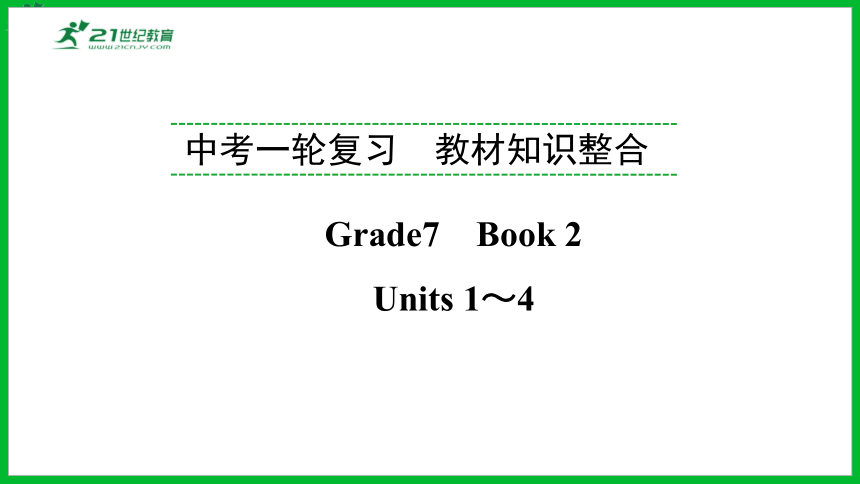
|
|
| 格式 | pptx | ||
| 文件大小 | 2.0MB | ||
| 资源类型 | 试卷 | ||
| 版本资源 | 人教版 | ||
| 科目 | 英语 | ||
| 更新时间 | 2025-05-10 21:07:14 | ||
图片预览

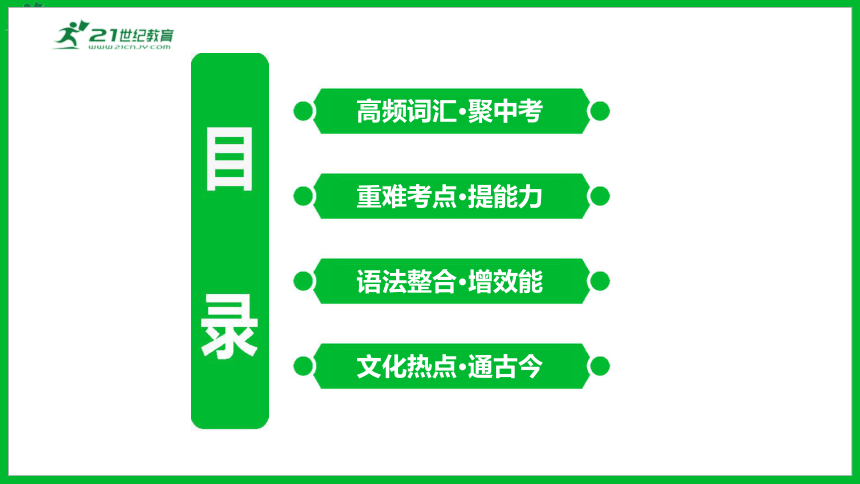
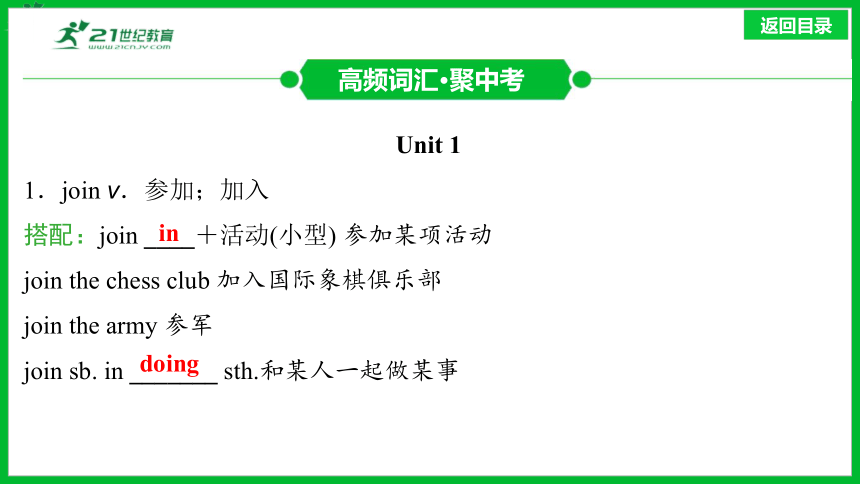
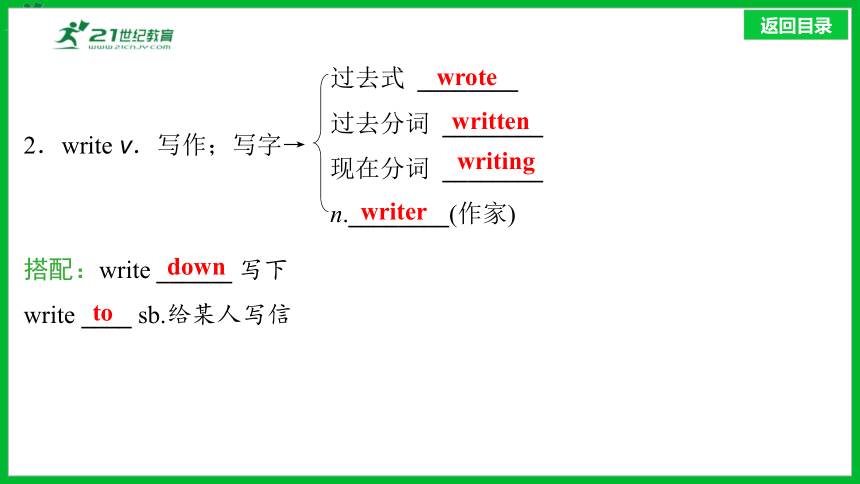
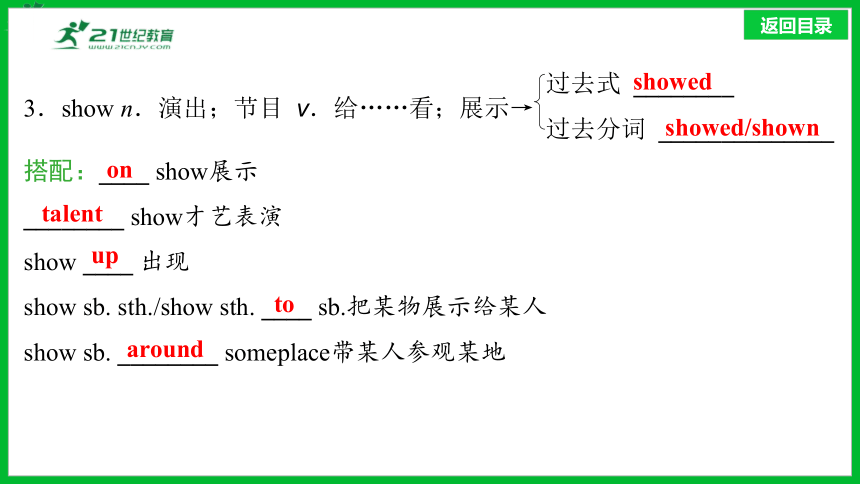
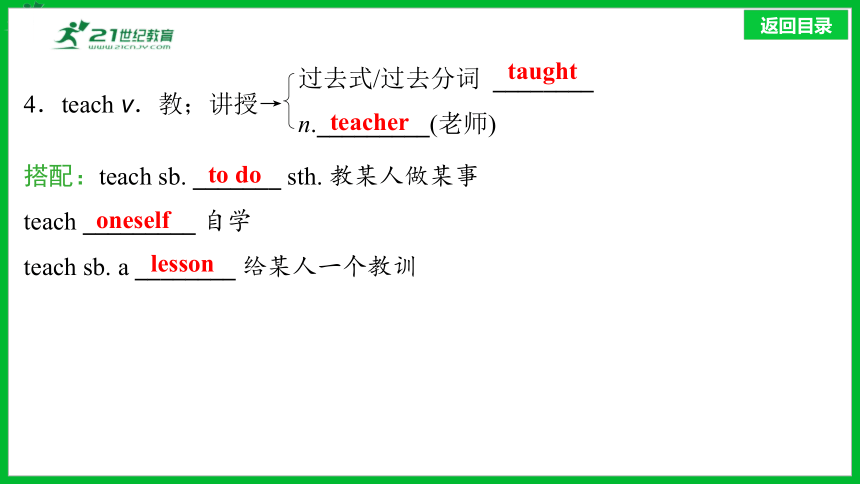

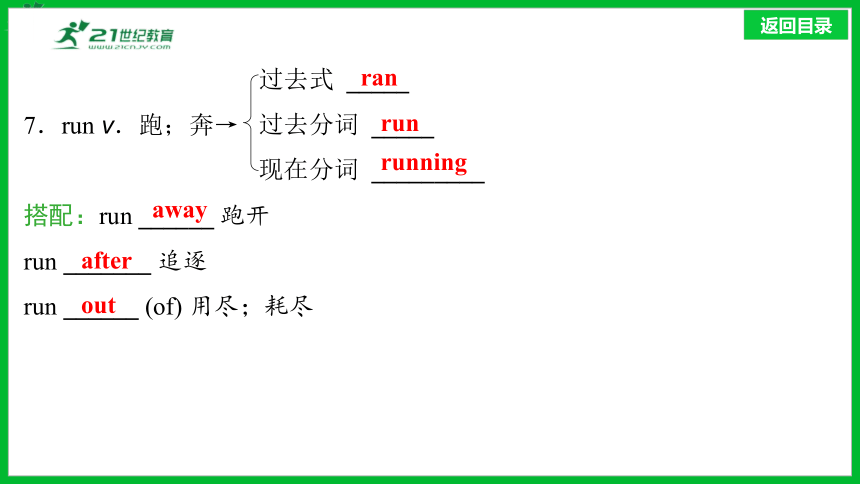

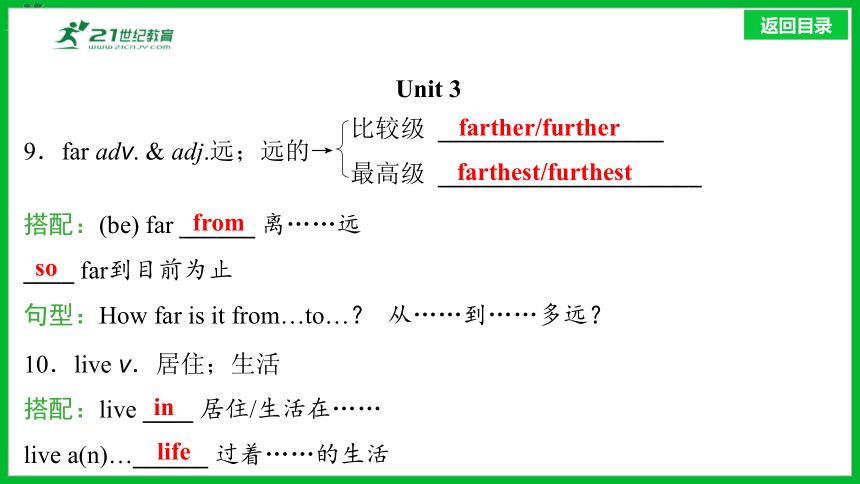
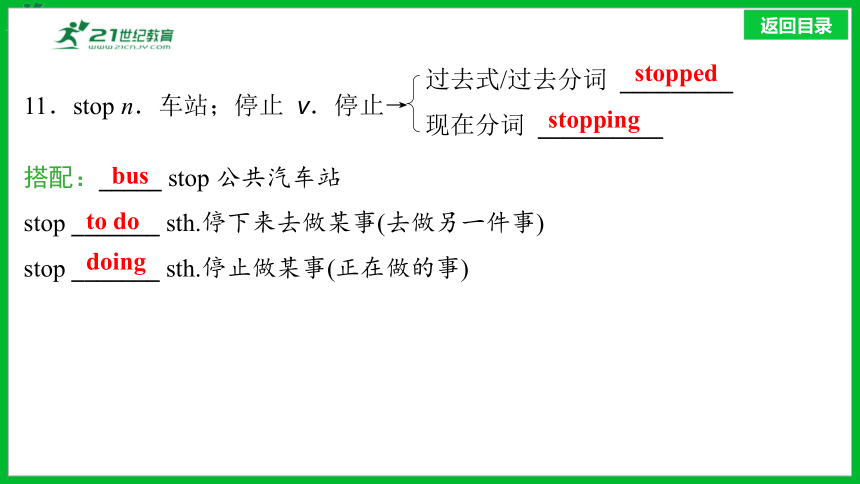
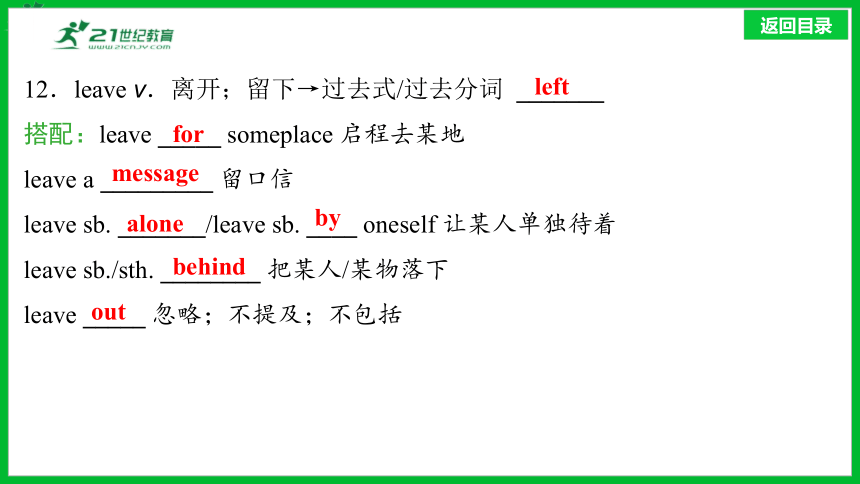
文档简介
(共70张PPT)
中考一轮复习 教材知识整合
Grade7 Book 2
Units 1~4
高频词汇·聚中考
重难考点·提能力
核心实验·提素养
语法整合·增效能
文化热点·通古今
Unit 1
1.join v.参加;加入
搭配:join ____+活动(小型) 参加某项活动
join the chess club 加入国际象棋俱乐部
join the army 参军
join sb. in _______ sth.和某人一起做某事
高频词汇·聚中考
in
doing
2.write v.写作;写字→
过去式 ________
过去分词 ________
现在分词 ________
n.________(作家)
搭配:write ______ 写下
write ____ sb.给某人写信
wrote
written
writing
writer
down
to
3.show n.演出;节目 v.给……看;展示→
过去式 ________
过去分词 ______________
搭配:____ show展示
________ show才艺表演
show ____ 出现
show sb. sth./show sth. ____ sb.把某物展示给某人
show sb. ________ someplace带某人参观某地
showed
showed/shown
on
talent
up
to
around
4.teach v.教;讲授→
过去式/过去分词 ________
n._________(老师)
搭配:teach sb. _______ sth. 教某人做某事
teach _________ 自学
teach sb. a ________ 给某人一个教训
taught
teacher
to do
oneself
lesson
Unit 2
5.work v. & n.工作 →n.________(工人)
搭配:work _____ 算出;解决
work _______ 努力学习;辛勤工作
work ____ 从事
____ work 在工作
6.exercise v. & n.锻炼;练习
搭配:__________ exercise 锻炼
____+学科+exercises 做……(学科)练习题
worker
out
hard
on
at
take/do
do
7.run v.跑;奔→
过去式 _____
过去分词 _____
现在分词 _________
搭配:run ______ 跑开
run _______ 追逐
run ______ (of) 用尽;耗尽
ran
run
running
away
after
out
8.walk n. & v.行走;步行
搭配:______ a walk散步;走一走
walk ______ 走路时撞到
walk ______ (from) (从……)走开
walk ________ 四处走走
take
into
away
around
Unit 3
9.far adv. & adj.远;远的→
比较级 __________________
最高级 _____________________
搭配:(be) far ______ 离……远
____ far到目前为止
句型:How far is it from…to…? 从……到……多远?
10.live v.居住;生活
搭配:live ____ 居住/生活在……
live a(n)…______ 过着……的生活
farther/further
farthest/furthest
from
so
in
life
11.stop n.车站;停止 v.停止→
过去式/过去分词 _________
现在分词 __________
搭配:_____ stop 公共汽车站
stop _______ sth.停下来去做某事(去做另一件事)
stop _______ sth.停止做某事(正在做的事)
stopped
stopping
bus
to do
doing
12.leave v.离开;留下→过去式/过去分词 _______
搭配:leave _____ someplace 启程去某地
leave a _________ 留口信
leave sb. _______/leave sb. ____ oneself 让某人单独待着
leave sb./sth. ________ 把某人/某物落下
leave _____ 忽略;不提及;不包括
left
for
message
alone
by
behind
out
Unit 4
13.fight v. & n.打架;战斗→过去式/过去分词 ________
搭配:fight _______ 和……打架;和……并肩战斗(后只接表示人或国家的名词)
fight _________ 为反对……而斗争;与……战斗(后接表示事物、人或国家的名词)
fight _____ 为了……而战斗
______ a fight 打架;战斗
fought
with
against
for
have
14.bring v.带来;取来→过去式/过去分词 ___ ______
搭配:bring sb. sth./bring sth. ____ sb. 把某物带给某人
bring sth. ____ someplace把某物带到某地(强调从别处带到说话人所在的地方)
bring _____ 使显现;使表现出
bring ______ 恢复;使想起;归还
15.practice v.& n.练习
搭配:practice _______ sth.练习做某事
brought
to
to
out
back
doing
16.strict adj.严格的;严厉的
搭配:be strict ______ sb. 对某人要求严格
be strict _______ sth. 对某事要求严格
be strict ____ (doing) sth. 在(做)某事上要求严格
with
about
in
17.learn v.学习;学会【2024.36;2024.39】→
过去式/过去分词
_________________
n. _________(学习者)
搭配:learn ______ 向……学习
learn _______ 了解
learn _______ sth. 学习做某事
learned/learnt
learner
from
about
to do
1.taste
熟词生义
A.v.有……的味道;品尝 B.n.味道;滋味 C.n.鉴赏力;品味
( )(1)I don't like the taste of onions, so I seldom cook with them.
( )(2)Maria is thought to have good taste in music.The songs she chooses to listen to are pleasant.
( )(3)The local food becomes so popular that people all over China travel there to taste it.
B
C
A
2.draw
A.v.画 B.v.吸引
( )(1)Sam puts the paper on the desk and draws a beautiful flower on it.
( )(2)Our Chinese teacher usually uses special teaching ways to draw our attention.
A
B
3.run
A.v.跑;奔跑 B.v.管理;经营 C.n.跑;跑步
( )(1)The dogs run off as soon as we appear in front of the door.
( )(2)Dad likes going for a run every morning, so he's in good health.
( )(3)He is a beginner and has no idea how to run a business.
A
C
B
4.live
A.v.居住;生活 B.v.生存;活着 C.adj.现场的
( )(1)Spiders can live for several days without food.
( )(2)My father spent hours watching a live TV programme about the Shenzhou-18.
( )(3)China is working hard now to make the earth a better place to live.
B
C
A
5.rule
A.n.规则;规章 B.v.支配;统治
( )(1)Eighty million years ago, dinosaurs ruled the earth.
( )(2)Without unwritten rules, civilized life would be impossible.
B
A
单项填空
1.My teacher tells us that the more you ________, the better you will speak English.
A.avoid B.prefer
C.practise D.enjoy
词汇攻关
C
2.If you want to lose weight, keeping a healthy diet and doing more _____ are your best choices.
A.work B.research
C.business D.exercise
D
3.-It's almost eight o'clock in the evening. We must hurry to catch the last bus.
-Just a second. I am reading my emails and then we'll ________ right now.
A.come B.leave
C.stay D.stop
B
4.We should know that mistakes are part of our life and we just need to _____ them and do better next time.
A.give up B.learn from
C.put on D.look through
B
单词拼写
5.A great number of young people joined the army and f________(战斗) for their country.
6.Paul needs to get up early because he lives f____(远) from school.
7.The workers were very tired, but none of them s________(停止) working.
ought
ar
topped
8.Da Vinci drew pictures and w______(写) about his creative ideas in his diaries.
9.In today's DIY class, our teacher t_______(教) us to make kites in different shapes.
10.I r____(跑) quickly into Mrs Sun's kitchen, put a wet blanket over her and helped her out.
rote
an
aught
【教材例句】 But he is not afraid because he loves school. 但是他不害怕,因为他喜欢学校。【七(下)Unit 3 P17】
重难考点·提能力
afraid的用法
考点1
e.g. She was afraid to tell her parents about it. 她不敢把这件事告诉她的父母。【八(上)Unit 10 P77】
Don't be afraid of failures because you can learn valuable experience from them. 不要害怕失败,因为你可以从中学到宝贵的经验。
注意:在口语中,I'm afraid之后可以接so或not来表示省略,指代上文提到的内容。I'm afraid so.意为“恐怕是这样的。” I'm afraid not.意为“恐怕不是这样的;恐怕不行。”
keep的用法
考点2
【教材例句】Keep my hair short. 把我的头发剪短。【七(下)Unit 4 P24】
e.g. Shirley often talks to her husband to keep him awake when he drives at night.雪莉经常和她丈夫说话,让他在晚上开车时保持清醒。
Our nails help keep our fingers from getting hurt. 我们的指甲有助于防止手指受伤。
Students have to keep improving themselves,or they will fall behind. 学生们必须不断提升他们自己,否则他们就会落后。
Every time I want to give up, my parents encourage me to keep trying.每次我想放弃的时候,我的父母都鼓励我继续尝试。
【教材例句】 Can Wu Jun speak English?吴军会说英语吗?【七(下)Unit 1 P3】
辨析speak、tell、say与talk
考点3
考 点 用 法 相关词组
speak (spoke-spoken-speaker) 强调说话方式和能力或说某种语言 speak to对……讲;和……说话
speak English 说英语
tell(told-told-teller) 强调讲给别人听 tell a story/stories讲故事
tell sb. (about)sth. 告诉某人(关于)某事
tell sb. (not) to do sth.告诉某人(不要)做某事
考 点 用 法 相关词组
say (said-said-saying) 强调说话的内容 say goodbye/thanks/sorry to sb.向某人告别、告辞/表示感谢/道歉
talk 强调与某人交谈,常与to、about、with等介词连用 talk to/with sb. 与某人交谈
talk about sth. 谈论某事
e.g.Let's try to speak English as much as possible.让我们尽量多说英语。
At eleven o'clock, we have a break in the playground and I talk to/with my friends.十一点,我们在操场休息,我和我的朋友们交谈。
My mom did not say anything and walked away. 我妈妈什么都没说,走开了。【八(下)Unit 3 P19】
The teacher was a writer, and she asked us to talk about our lives and tell interesting stories. 那个老师是一位作家,她让我们谈论我们的生活,并讲有趣的故事。
The guard told them to go downstairs to the lost and found office.警卫叫他们下楼去失物招领处。
【教材例句】 She takes the subway. 她乘地铁。【七(下)Unit 3 P13】
询问交通方式的常用问句为:How do/does+sb.+go/get(to)…? 意为“某人如何去……?”,其常见的答语如下:
交通方式的表达
考点4
e.g. It takes about 40 minutes to get there by bus. 乘公共汽车去那里大约需要40分钟。【七(下)Unit 3 P18】
My mother seldom goes to work in her car. 我妈妈很少开她的车去上班。【七(下)Unit 3 P18】
Let's take a taxi to go there. 让我们乘出租车去那儿吧。
My father works near our home, so he goes to work on foot every day. 我爸爸在我们家附近工作,所以他每天步行上班。
【教材例句】 Does he have to wear a uniform at school?他在学校得穿校服吗?【七(下)Unit 4 P21】
辨析 wear、(be) in、dress 与put on
考点5
考 点 用 法 wear be in+颜色/衣服,表示“穿着……” 表状态
(be) in wear +衣服/首饰等,表示“穿着/戴着……” dress be dressed in+衣服,表示“穿着……” 考 点 用 法 dress dress up 打扮;穿上盛装 get dressed 装扮;乔装打扮 dress+sb./oneself 给某人/自己穿衣服 表动作
put on put on+衣服,表示“穿上……”
The little girl put on her coat and went out. She looked beautiful in a red hat today. She also wore a red scarf. Her mother was very glad that she could dress herself.那个小女孩穿上她的外套出去了。她今天戴着一顶红色的帽子,看起来很漂亮。她还围着一条红色的围巾。她妈妈很高兴她能自己穿衣服。
一 言 辨 异
单项填空
1.Did you notice the woman ________ red
A.on B.at
C.for D.in
活学巧练
D
2.-I have a poor sense of direction, so I'm afraid ________ going out alone.
-Don't worry. A lot of apps can help you.
A.out B.of
C.over D.to
B
3.-Peter, how do you go to school every day
-I usually walk, but this morning I ________ my bike because of the limited time.
A.rode B.ran
C.drove D.took
A
4.Nowadays, many people choose to go to work ________ subway instead of driving.
A.with B.by
C.on D.in
B
5.To keep children away ________ danger, we warn parents not to leave children at home alone.
A.with B.for
C.from D.into
C
6.-Mr Brown, how can we keep safe when we are skating
-Slow down and remember to ________your helmets.
A.take off B.put on
C.move away D.get out
B
7.-Can we go to the zoo this weekend
-________. We must prepare for the exam first.
A.Yes, please B.It's up to you
C.I'm afraid so D.I'm afraid not
D
单词拼写
8.Mr Wu t_____(讲述) us an interesting story and the story was about Heidi.
9.If you k_____(持续)doing sports,you will be much healthier than before.
10.Drivers must w______(系,戴) seat belts while their cars are running on the road.
11.It is necessary for students to t_____(谈论) about their school life with parents every day.
old
eep
ear
alk
12.At the end of the year, we s____(说) goodbye to the past and welcome the future with hope.
13.We should keep practising even though it takes a long time to learn to s______(说) a language.
14.In the movie, Mulan d________(穿衣服) herself like a boy and takes her father's place to fight in the army.
ay
peak
resses
介词和介词短语
语法整合·增效能
时间介词
考点1
表时间
表时间
方位介词
考点2
in在……里 on在……上 above在……上方 behind在……后面
over在……上方 between 在……(两者)之间 among在……(三者 或三者以上)之间 before在……前面
under 在……下方 below 在……下方 next to 在……近旁 near 在……附近
beside 在……旁边 by在……旁边 in front of 在…… (外部)前方 in the front of 在……
(内部)前方
方式介词
考点3
介 词 用 法 示 例
on “通过,用”,后接通讯工具或电子产品 on the Internet通过网络,在网上
on the phone 通过电话;在通话中
on TV在电视上
with 用具体的东西,后接表示工具或身体部位的词 You can see it with your own eyes. 你可以亲眼看它。
介 词 用 法 示 例
by 用……手段或方式,后接动名词或交通工具 by listening to music 通过听音乐
by bus乘公交车
in 用语言、声音、原材料、颜色、服装等 in English用英语
in a low voice用低音
其他常见介词
考点4
介词短语
考点5
单项填空
1.-How do you make yourself relaxed before you give a speech
-________ taking a deep breath.
A.With B.On
C.For D.By
语法闯关
D
2.There weren't any roads ________ our village and my school before, but it is different now.
A.between B.from
C.across D.behind
A
3.The Shenzhou-18 spaceship was sent into space successfully ________ the evening of 25 April, 2024.
A.in B.on
C.at D.by
B
4.If my best friends get into trouble,I will help them ________ thinking twice.
A.for B.with
C.from D.without
D
5.There is a piano ________ the wall in my study. I usually practise playing it in my free time.
A.above B.against
C.around D.among
B
文化热点·通古今
话题:中国“三蹦子”火到美国 体裁:说明文 词数:约250
难度:★★★ 建议用时:6分钟 实际用时: 正确率:
Electric tricycles(电动三轮车) are something commonly seen in China, especially in the countryside. Surprisingly, a Chinese-made electric tricycle appeared on the streets of an American town. The tricycle was actually a gift from a Chinese girl, Wu Bo, for her father-in-law, but soon attracted the interest of the locals.
Wu recorded the tricycle's first journey down the town's streets in her video. Its unusual look and the unmistakable “please be careful when reversing(倒车)” warning caught people's attention. ①The tricycle's cool and practical design was so popular with the locals that they took photos and had fun taking a ride. Some even asked how to buy one.
The story of Wu's family is not strange in the USA. ②A large number of Americans have ordered Chinese-made electric tricycles. The growing popularity of these vehicles is a result of China's long-term hard work in making cheap but fine products.
The electric tricycle Wu bought was produced by a factory in Wuxi, Jiangsu. The factory produces plenty of motorcycles and electric vehicles every year, and sells them to many places worldwide. Their products are cheap and simple to use. And most of them use green energy. What's more, the factory keeps improving its products to meet the needs of customers.
Besides electric tricycles, products like Chinese-made electric buses and fans are also the loves of foreign customers.③In the future, it is believed that more Chinese-made products will become popular abroad.
1.Why are tricycles so popular with Americans?( )
A.Because of their cool and practical design.
B.Because they're popular and common.
C.Because they're interesting and strange.
D.Because of their unusual look and unmistakable warning.
精准检测
A
2.Which of the following is TRUE according to the text ( )
A.It's not easy for Americans to use the tricycle.
B.Foreign consumers are only interested in tricycles.
C.The number of tricycle buyers in America is rising.
D.The tricycle Wu bought was produced in the USA.
C
3.What does the writer think of the future of Chinese-made products ( )
A.It's bright. B.It's awful.
C.It's unclear. D.It's funny.
A
单词:attract v.吸引 local n.当地人 design n.设计
短语:catch one's attention 吸引某人的注意力
句式:In the future, it is believed that more Chinese-made products will become popular abroad. 在未来,人们相信,更多中国制造的产品将在国外大受欢迎。 【适用话题:事物介绍】
积累卡
中考一轮复习 教材知识整合
Grade7 Book 2
Units 1~4
高频词汇·聚中考
重难考点·提能力
核心实验·提素养
语法整合·增效能
文化热点·通古今
Unit 1
1.join v.参加;加入
搭配:join ____+活动(小型) 参加某项活动
join the chess club 加入国际象棋俱乐部
join the army 参军
join sb. in _______ sth.和某人一起做某事
高频词汇·聚中考
in
doing
2.write v.写作;写字→
过去式 ________
过去分词 ________
现在分词 ________
n.________(作家)
搭配:write ______ 写下
write ____ sb.给某人写信
wrote
written
writing
writer
down
to
3.show n.演出;节目 v.给……看;展示→
过去式 ________
过去分词 ______________
搭配:____ show展示
________ show才艺表演
show ____ 出现
show sb. sth./show sth. ____ sb.把某物展示给某人
show sb. ________ someplace带某人参观某地
showed
showed/shown
on
talent
up
to
around
4.teach v.教;讲授→
过去式/过去分词 ________
n._________(老师)
搭配:teach sb. _______ sth. 教某人做某事
teach _________ 自学
teach sb. a ________ 给某人一个教训
taught
teacher
to do
oneself
lesson
Unit 2
5.work v. & n.工作 →n.________(工人)
搭配:work _____ 算出;解决
work _______ 努力学习;辛勤工作
work ____ 从事
____ work 在工作
6.exercise v. & n.锻炼;练习
搭配:__________ exercise 锻炼
____+学科+exercises 做……(学科)练习题
worker
out
hard
on
at
take/do
do
7.run v.跑;奔→
过去式 _____
过去分词 _____
现在分词 _________
搭配:run ______ 跑开
run _______ 追逐
run ______ (of) 用尽;耗尽
ran
run
running
away
after
out
8.walk n. & v.行走;步行
搭配:______ a walk散步;走一走
walk ______ 走路时撞到
walk ______ (from) (从……)走开
walk ________ 四处走走
take
into
away
around
Unit 3
9.far adv. & adj.远;远的→
比较级 __________________
最高级 _____________________
搭配:(be) far ______ 离……远
____ far到目前为止
句型:How far is it from…to…? 从……到……多远?
10.live v.居住;生活
搭配:live ____ 居住/生活在……
live a(n)…______ 过着……的生活
farther/further
farthest/furthest
from
so
in
life
11.stop n.车站;停止 v.停止→
过去式/过去分词 _________
现在分词 __________
搭配:_____ stop 公共汽车站
stop _______ sth.停下来去做某事(去做另一件事)
stop _______ sth.停止做某事(正在做的事)
stopped
stopping
bus
to do
doing
12.leave v.离开;留下→过去式/过去分词 _______
搭配:leave _____ someplace 启程去某地
leave a _________ 留口信
leave sb. _______/leave sb. ____ oneself 让某人单独待着
leave sb./sth. ________ 把某人/某物落下
leave _____ 忽略;不提及;不包括
left
for
message
alone
by
behind
out
Unit 4
13.fight v. & n.打架;战斗→过去式/过去分词 ________
搭配:fight _______ 和……打架;和……并肩战斗(后只接表示人或国家的名词)
fight _________ 为反对……而斗争;与……战斗(后接表示事物、人或国家的名词)
fight _____ 为了……而战斗
______ a fight 打架;战斗
fought
with
against
for
have
14.bring v.带来;取来→过去式/过去分词 ___ ______
搭配:bring sb. sth./bring sth. ____ sb. 把某物带给某人
bring sth. ____ someplace把某物带到某地(强调从别处带到说话人所在的地方)
bring _____ 使显现;使表现出
bring ______ 恢复;使想起;归还
15.practice v.& n.练习
搭配:practice _______ sth.练习做某事
brought
to
to
out
back
doing
16.strict adj.严格的;严厉的
搭配:be strict ______ sb. 对某人要求严格
be strict _______ sth. 对某事要求严格
be strict ____ (doing) sth. 在(做)某事上要求严格
with
about
in
17.learn v.学习;学会【2024.36;2024.39】→
过去式/过去分词
_________________
n. _________(学习者)
搭配:learn ______ 向……学习
learn _______ 了解
learn _______ sth. 学习做某事
learned/learnt
learner
from
about
to do
1.taste
熟词生义
A.v.有……的味道;品尝 B.n.味道;滋味 C.n.鉴赏力;品味
( )(1)I don't like the taste of onions, so I seldom cook with them.
( )(2)Maria is thought to have good taste in music.The songs she chooses to listen to are pleasant.
( )(3)The local food becomes so popular that people all over China travel there to taste it.
B
C
A
2.draw
A.v.画 B.v.吸引
( )(1)Sam puts the paper on the desk and draws a beautiful flower on it.
( )(2)Our Chinese teacher usually uses special teaching ways to draw our attention.
A
B
3.run
A.v.跑;奔跑 B.v.管理;经营 C.n.跑;跑步
( )(1)The dogs run off as soon as we appear in front of the door.
( )(2)Dad likes going for a run every morning, so he's in good health.
( )(3)He is a beginner and has no idea how to run a business.
A
C
B
4.live
A.v.居住;生活 B.v.生存;活着 C.adj.现场的
( )(1)Spiders can live for several days without food.
( )(2)My father spent hours watching a live TV programme about the Shenzhou-18.
( )(3)China is working hard now to make the earth a better place to live.
B
C
A
5.rule
A.n.规则;规章 B.v.支配;统治
( )(1)Eighty million years ago, dinosaurs ruled the earth.
( )(2)Without unwritten rules, civilized life would be impossible.
B
A
单项填空
1.My teacher tells us that the more you ________, the better you will speak English.
A.avoid B.prefer
C.practise D.enjoy
词汇攻关
C
2.If you want to lose weight, keeping a healthy diet and doing more _____ are your best choices.
A.work B.research
C.business D.exercise
D
3.-It's almost eight o'clock in the evening. We must hurry to catch the last bus.
-Just a second. I am reading my emails and then we'll ________ right now.
A.come B.leave
C.stay D.stop
B
4.We should know that mistakes are part of our life and we just need to _____ them and do better next time.
A.give up B.learn from
C.put on D.look through
B
单词拼写
5.A great number of young people joined the army and f________(战斗) for their country.
6.Paul needs to get up early because he lives f____(远) from school.
7.The workers were very tired, but none of them s________(停止) working.
ought
ar
topped
8.Da Vinci drew pictures and w______(写) about his creative ideas in his diaries.
9.In today's DIY class, our teacher t_______(教) us to make kites in different shapes.
10.I r____(跑) quickly into Mrs Sun's kitchen, put a wet blanket over her and helped her out.
rote
an
aught
【教材例句】 But he is not afraid because he loves school. 但是他不害怕,因为他喜欢学校。【七(下)Unit 3 P17】
重难考点·提能力
afraid的用法
考点1
e.g. She was afraid to tell her parents about it. 她不敢把这件事告诉她的父母。【八(上)Unit 10 P77】
Don't be afraid of failures because you can learn valuable experience from them. 不要害怕失败,因为你可以从中学到宝贵的经验。
注意:在口语中,I'm afraid之后可以接so或not来表示省略,指代上文提到的内容。I'm afraid so.意为“恐怕是这样的。” I'm afraid not.意为“恐怕不是这样的;恐怕不行。”
keep的用法
考点2
【教材例句】Keep my hair short. 把我的头发剪短。【七(下)Unit 4 P24】
e.g. Shirley often talks to her husband to keep him awake when he drives at night.雪莉经常和她丈夫说话,让他在晚上开车时保持清醒。
Our nails help keep our fingers from getting hurt. 我们的指甲有助于防止手指受伤。
Students have to keep improving themselves,or they will fall behind. 学生们必须不断提升他们自己,否则他们就会落后。
Every time I want to give up, my parents encourage me to keep trying.每次我想放弃的时候,我的父母都鼓励我继续尝试。
【教材例句】 Can Wu Jun speak English?吴军会说英语吗?【七(下)Unit 1 P3】
辨析speak、tell、say与talk
考点3
考 点 用 法 相关词组
speak (spoke-spoken-speaker) 强调说话方式和能力或说某种语言 speak to对……讲;和……说话
speak English 说英语
tell(told-told-teller) 强调讲给别人听 tell a story/stories讲故事
tell sb. (about)sth. 告诉某人(关于)某事
tell sb. (not) to do sth.告诉某人(不要)做某事
考 点 用 法 相关词组
say (said-said-saying) 强调说话的内容 say goodbye/thanks/sorry to sb.向某人告别、告辞/表示感谢/道歉
talk 强调与某人交谈,常与to、about、with等介词连用 talk to/with sb. 与某人交谈
talk about sth. 谈论某事
e.g.Let's try to speak English as much as possible.让我们尽量多说英语。
At eleven o'clock, we have a break in the playground and I talk to/with my friends.十一点,我们在操场休息,我和我的朋友们交谈。
My mom did not say anything and walked away. 我妈妈什么都没说,走开了。【八(下)Unit 3 P19】
The teacher was a writer, and she asked us to talk about our lives and tell interesting stories. 那个老师是一位作家,她让我们谈论我们的生活,并讲有趣的故事。
The guard told them to go downstairs to the lost and found office.警卫叫他们下楼去失物招领处。
【教材例句】 She takes the subway. 她乘地铁。【七(下)Unit 3 P13】
询问交通方式的常用问句为:How do/does+sb.+go/get(to)…? 意为“某人如何去……?”,其常见的答语如下:
交通方式的表达
考点4
e.g. It takes about 40 minutes to get there by bus. 乘公共汽车去那里大约需要40分钟。【七(下)Unit 3 P18】
My mother seldom goes to work in her car. 我妈妈很少开她的车去上班。【七(下)Unit 3 P18】
Let's take a taxi to go there. 让我们乘出租车去那儿吧。
My father works near our home, so he goes to work on foot every day. 我爸爸在我们家附近工作,所以他每天步行上班。
【教材例句】 Does he have to wear a uniform at school?他在学校得穿校服吗?【七(下)Unit 4 P21】
辨析 wear、(be) in、dress 与put on
考点5
考 点 用 法 wear be in+颜色/衣服,表示“穿着……” 表状态
(be) in wear +衣服/首饰等,表示“穿着/戴着……” dress be dressed in+衣服,表示“穿着……” 考 点 用 法 dress dress up 打扮;穿上盛装 get dressed 装扮;乔装打扮 dress+sb./oneself 给某人/自己穿衣服 表动作
put on put on+衣服,表示“穿上……”
The little girl put on her coat and went out. She looked beautiful in a red hat today. She also wore a red scarf. Her mother was very glad that she could dress herself.那个小女孩穿上她的外套出去了。她今天戴着一顶红色的帽子,看起来很漂亮。她还围着一条红色的围巾。她妈妈很高兴她能自己穿衣服。
一 言 辨 异
单项填空
1.Did you notice the woman ________ red
A.on B.at
C.for D.in
活学巧练
D
2.-I have a poor sense of direction, so I'm afraid ________ going out alone.
-Don't worry. A lot of apps can help you.
A.out B.of
C.over D.to
B
3.-Peter, how do you go to school every day
-I usually walk, but this morning I ________ my bike because of the limited time.
A.rode B.ran
C.drove D.took
A
4.Nowadays, many people choose to go to work ________ subway instead of driving.
A.with B.by
C.on D.in
B
5.To keep children away ________ danger, we warn parents not to leave children at home alone.
A.with B.for
C.from D.into
C
6.-Mr Brown, how can we keep safe when we are skating
-Slow down and remember to ________your helmets.
A.take off B.put on
C.move away D.get out
B
7.-Can we go to the zoo this weekend
-________. We must prepare for the exam first.
A.Yes, please B.It's up to you
C.I'm afraid so D.I'm afraid not
D
单词拼写
8.Mr Wu t_____(讲述) us an interesting story and the story was about Heidi.
9.If you k_____(持续)doing sports,you will be much healthier than before.
10.Drivers must w______(系,戴) seat belts while their cars are running on the road.
11.It is necessary for students to t_____(谈论) about their school life with parents every day.
old
eep
ear
alk
12.At the end of the year, we s____(说) goodbye to the past and welcome the future with hope.
13.We should keep practising even though it takes a long time to learn to s______(说) a language.
14.In the movie, Mulan d________(穿衣服) herself like a boy and takes her father's place to fight in the army.
ay
peak
resses
介词和介词短语
语法整合·增效能
时间介词
考点1
表时间
表时间
方位介词
考点2
in在……里 on在……上 above在……上方 behind在……后面
over在……上方 between 在……(两者)之间 among在……(三者 或三者以上)之间 before在……前面
under 在……下方 below 在……下方 next to 在……近旁 near 在……附近
beside 在……旁边 by在……旁边 in front of 在…… (外部)前方 in the front of 在……
(内部)前方
方式介词
考点3
介 词 用 法 示 例
on “通过,用”,后接通讯工具或电子产品 on the Internet通过网络,在网上
on the phone 通过电话;在通话中
on TV在电视上
with 用具体的东西,后接表示工具或身体部位的词 You can see it with your own eyes. 你可以亲眼看它。
介 词 用 法 示 例
by 用……手段或方式,后接动名词或交通工具 by listening to music 通过听音乐
by bus乘公交车
in 用语言、声音、原材料、颜色、服装等 in English用英语
in a low voice用低音
其他常见介词
考点4
介词短语
考点5
单项填空
1.-How do you make yourself relaxed before you give a speech
-________ taking a deep breath.
A.With B.On
C.For D.By
语法闯关
D
2.There weren't any roads ________ our village and my school before, but it is different now.
A.between B.from
C.across D.behind
A
3.The Shenzhou-18 spaceship was sent into space successfully ________ the evening of 25 April, 2024.
A.in B.on
C.at D.by
B
4.If my best friends get into trouble,I will help them ________ thinking twice.
A.for B.with
C.from D.without
D
5.There is a piano ________ the wall in my study. I usually practise playing it in my free time.
A.above B.against
C.around D.among
B
文化热点·通古今
话题:中国“三蹦子”火到美国 体裁:说明文 词数:约250
难度:★★★ 建议用时:6分钟 实际用时: 正确率:
Electric tricycles(电动三轮车) are something commonly seen in China, especially in the countryside. Surprisingly, a Chinese-made electric tricycle appeared on the streets of an American town. The tricycle was actually a gift from a Chinese girl, Wu Bo, for her father-in-law, but soon attracted the interest of the locals.
Wu recorded the tricycle's first journey down the town's streets in her video. Its unusual look and the unmistakable “please be careful when reversing(倒车)” warning caught people's attention. ①The tricycle's cool and practical design was so popular with the locals that they took photos and had fun taking a ride. Some even asked how to buy one.
The story of Wu's family is not strange in the USA. ②A large number of Americans have ordered Chinese-made electric tricycles. The growing popularity of these vehicles is a result of China's long-term hard work in making cheap but fine products.
The electric tricycle Wu bought was produced by a factory in Wuxi, Jiangsu. The factory produces plenty of motorcycles and electric vehicles every year, and sells them to many places worldwide. Their products are cheap and simple to use. And most of them use green energy. What's more, the factory keeps improving its products to meet the needs of customers.
Besides electric tricycles, products like Chinese-made electric buses and fans are also the loves of foreign customers.③In the future, it is believed that more Chinese-made products will become popular abroad.
1.Why are tricycles so popular with Americans?( )
A.Because of their cool and practical design.
B.Because they're popular and common.
C.Because they're interesting and strange.
D.Because of their unusual look and unmistakable warning.
精准检测
A
2.Which of the following is TRUE according to the text ( )
A.It's not easy for Americans to use the tricycle.
B.Foreign consumers are only interested in tricycles.
C.The number of tricycle buyers in America is rising.
D.The tricycle Wu bought was produced in the USA.
C
3.What does the writer think of the future of Chinese-made products ( )
A.It's bright. B.It's awful.
C.It's unclear. D.It's funny.
A
单词:attract v.吸引 local n.当地人 design n.设计
短语:catch one's attention 吸引某人的注意力
句式:In the future, it is believed that more Chinese-made products will become popular abroad. 在未来,人们相信,更多中国制造的产品将在国外大受欢迎。 【适用话题:事物介绍】
积累卡
